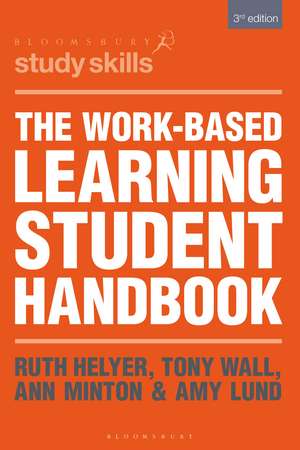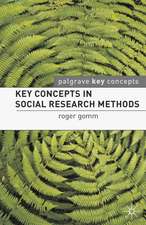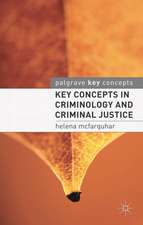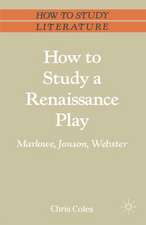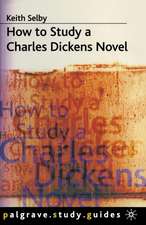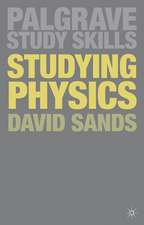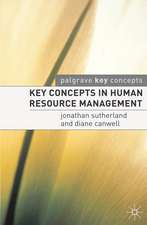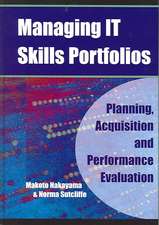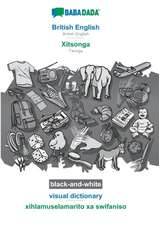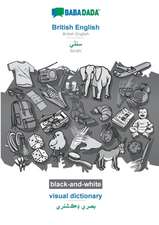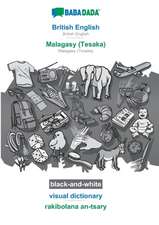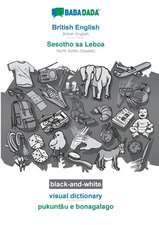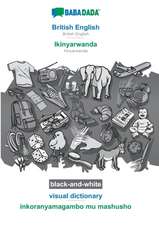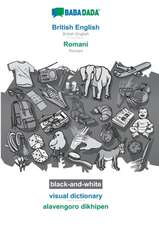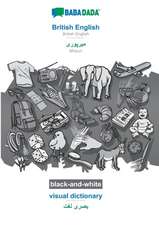The Work-Based Learning Student Handbook: Bloomsbury Study Skills
Editat de Ruth Helyer, Tony Wall, Ann Minton, Amy Lund Contribuţii de David Perrin, Debbie Simpson, Denise Meakin, Lisa Rowe, Nadira Mirza, Kirsty Beckett, Sarah Scowcroft, Pam Hadfield, Sue Graham, Kevin Ions, Norma Sutcliffe, Jonathan Garnett, Param Abraham, Selva Abraham, Stavroula Bibila, Paula Nottingham, Kelvin Leong, Anna Sung, Stuart Cunningham, John Henryen Limba Engleză Paperback – 14 dec 2020
Din seria Bloomsbury Study Skills
- 8%
 Preț: 113.15 lei
Preț: 113.15 lei - 5%
 Preț: 113.19 lei
Preț: 113.19 lei -
 Preț: 147.12 lei
Preț: 147.12 lei -
 Preț: 146.94 lei
Preț: 146.94 lei - 13%
 Preț: 121.58 lei
Preț: 121.58 lei - 21%
 Preț: 125.30 lei
Preț: 125.30 lei - 6%
 Preț: 138.03 lei
Preț: 138.03 lei - 7%
 Preț: 109.89 lei
Preț: 109.89 lei - 7%
 Preț: 157.16 lei
Preț: 157.16 lei - 14%
 Preț: 198.74 lei
Preț: 198.74 lei - 13%
 Preț: 127.84 lei
Preț: 127.84 lei - 13%
 Preț: 154.50 lei
Preț: 154.50 lei - 5%
 Preț: 120.71 lei
Preț: 120.71 lei - 8%
 Preț: 197.14 lei
Preț: 197.14 lei - 6%
 Preț: 123.97 lei
Preț: 123.97 lei - 6%
 Preț: 132.56 lei
Preț: 132.56 lei -
 Preț: 114.22 lei
Preț: 114.22 lei - 8%
 Preț: 114.04 lei
Preț: 114.04 lei - 7%
 Preț: 135.20 lei
Preț: 135.20 lei - 6%
 Preț: 118.92 lei
Preț: 118.92 lei - 18%
 Preț: 120.41 lei
Preț: 120.41 lei - 19%
 Preț: 125.00 lei
Preț: 125.00 lei - 13%
 Preț: 189.38 lei
Preț: 189.38 lei - 14%
 Preț: 112.72 lei
Preț: 112.72 lei - 13%
 Preț: 106.77 lei
Preț: 106.77 lei - 14%
 Preț: 154.42 lei
Preț: 154.42 lei - 14%
 Preț: 165.91 lei
Preț: 165.91 lei - 8%
 Preț: 131.83 lei
Preț: 131.83 lei - 7%
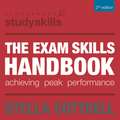 Preț: 149.90 lei
Preț: 149.90 lei - 12%
 Preț: 123.45 lei
Preț: 123.45 lei - 18%
 Preț: 133.61 lei
Preț: 133.61 lei -
 Preț: 131.80 lei
Preț: 131.80 lei -
 Preț: 166.58 lei
Preț: 166.58 lei - 7%
 Preț: 114.92 lei
Preț: 114.92 lei - 6%
 Preț: 123.97 lei
Preț: 123.97 lei - 13%
 Preț: 115.38 lei
Preț: 115.38 lei - 13%
 Preț: 115.84 lei
Preț: 115.84 lei - 8%
 Preț: 112.27 lei
Preț: 112.27 lei - 14%
 Preț: 120.87 lei
Preț: 120.87 lei -
 Preț: 234.89 lei
Preț: 234.89 lei - 7%
 Preț: 129.00 lei
Preț: 129.00 lei - 7%
 Preț: 162.20 lei
Preț: 162.20 lei - 14%
 Preț: 184.21 lei
Preț: 184.21 lei - 7%
 Preț: 157.62 lei
Preț: 157.62 lei -
 Preț: 108.78 lei
Preț: 108.78 lei -
 Preț: 167.87 lei
Preț: 167.87 lei - 13%
 Preț: 106.61 lei
Preț: 106.61 lei
Preț: 154.33 lei
Nou
Puncte Express: 231
Preț estimativ în valută:
29.53€ • 30.90$ • 24.53£
29.53€ • 30.90$ • 24.53£
Carte disponibilă
Livrare economică 12-26 martie
Preluare comenzi: 021 569.72.76
Specificații
ISBN-13: 9781352011548
ISBN-10: 1352011549
Pagini: 288
Dimensiuni: 156 x 234 x 20 mm
Greutate: 0.4 kg
Ediția:3rd ed. 2021
Editura: Bloomsbury Publishing
Colecția Bloomsbury Academic
Seria Bloomsbury Study Skills
Locul publicării:London, United Kingdom
ISBN-10: 1352011549
Pagini: 288
Dimensiuni: 156 x 234 x 20 mm
Greutate: 0.4 kg
Ediția:3rd ed. 2021
Editura: Bloomsbury Publishing
Colecția Bloomsbury Academic
Seria Bloomsbury Study Skills
Locul publicării:London, United Kingdom
Caracteristici
Helps learners to contextualise their own experiences, with clear explanations of the principles and practices of work-based learning
Notă biografică
Edited by:Ruth Helyer was Professor of Work-Based Learning at Leeds Trinity University, UK, and a National Teaching Fellow of the Higher Education Academy. Actively developing the work-based learning agenda since the early 2000s, she became an internationally acknowledged expert in this area, involved in the development of numerous working students and their companies. Ruth was the editor of Facilitating Work-Based Learning: A Handbook for Tutors (Red Globe Press, 2015) and Editor-in-Chief of the Emerald peer-reviewed journals Higher Education Skills and Work-Based Learning and Journal of Work-Applied Management. Ruth sadly passed away in 2019; the current editorial panel completed the publication of this third edition as a tribute to Ruth's life and work.Tony Wall is Founder and Head of the International Centre for Thriving at the University of Chester, UK, a global collaboration between business, arts, health, and education to deliver sustainable transformation for the common good. He is passionate about thriving and has published 200+ works, including articles in quartile 1 journals such as The International Journal of Human Resource Management and Vocations & Learning, as well as global policy reports for the European Mentoring & Coaching Council. His leadership and international impact in these areas have attracted numerous accolades including the prestigious Advance-HE National Teaching Fellowship and three Santander International Research Excellence Awards. Ann Minton is the University of Derby's Academic Lead for Apprenticeships. For the last ten years, Ann has been involved in developing bespoke and innovative education solutions for a range of businesses and organisations to meet their higher educational needs, including the university's award-winning approach to the accreditation of in-company training. Ann is an editor for the Making Employer and University Partnerships Work, an original publication sharing national best and innovative practice across the UK.Amy Lund is a Senior Teaching Fellow, the Head of Work-based Learning and Journalism Programme Leader at Leeds Trinity University, UK. Amy lived and worked as a Journalist in New York, Sydney and London before returning to Yorkshire. Combining her Postgraduate research with working as a magazine editor and a university lecturer, while raising a young family, Amy is an experienced work-based learner. She is passionate about expanding and promoting work-based learning. Amy also champions embedding work-integrated learning into university programmes and has developed specific learning spaces to facilitate this process.With contributions from:Anna Sung is a Senior Lecturer in Accounting and Finance at the University of Chester, UK. She has cross-disciplinary background in Finance, Technology, Business, Biotechnology and Higher Education. Anna is a pioneer in FinTech education. Before joining the University of Chester, she was Programme Leader of the UK's first undergraduate degree dedicated to FinTech and was the Founding Centre Lead of the FinTech Innovation Centre at Glyndwr University. She has worked for Universities in both Hong Kong and the UK. Her current research interests include Financial Technology (FinTech), innovation management, data mining and behavioural data analytics.David Perrin is Head of the Centre for Work Related Studies and Associate Professor at the University of Chester, UK. Over two decades he has developed and run one of Europe's largest work-based learning frameworks for undergraduate and postgraduate students. He has published widely in the field, with particular specialism in the accreditation of prior learning.Debbie Simpson is Director of Executive Education at Lancaster University Management School, UK. She leads development, delivery and quality assurance of work-based professional development for individuals and organisations; including Master's level Apprenticeships. Debbie has a background in education in schools and Higher Education, and has served as external examiner for several HEI work-based learning programmes. She is a Senior Fellow of the Higher Education Academy (SFHEA).Denise Meakin is Co-Deputy Head of the Centre for Work Related Studies at the University of Chester, UK, where she helps run the work-based learning framework. She is the Centre's lead academic in converting organisations' training materials and approaches into quality-assured, accredited HE courses of study and has several publications in this field and more generally in work-based learning.John Henry is a Lecturer in Games at Manchester Metropolitan University, UK. He received his PhD in Computer Science from Liverpool John Moores University in 2018, investigating the combination of Serious Games and the Internet of Things (IoT). After his PhD and a short period as an Associate Lecturer in Web Development at Edge Hill University, he entered the world of industry as a Software Engineer, programming a self-service kiosk with remote analytics and maintenance for a car hire company. He is actively researching utilising machine-learning with the Internet of Things and Games for mental and physical rehabilitation.Jonathan Garnett is Director and owner of Garnett Professional Development (GPD) Ltd. Through GPD Jonathan undertakes consultancy in the development and implementation of work-based learning at higher education level in the UK and internationally. Since 2014 Jonathan has worked with a range of English universities to develop their Degree Apprenticeship capability through work-based learning. Prior to 2014 Jonathan was the Director of the Institute for Work-Based Learning at Middlesex University, UK. Jonathan has over twenty-eight years' experience of the development and operation of work-based learning partnerships in the public, private and voluntary sectors at higher education level.Lisa Rowe is Co-Deputy Head of the Centre for Work Related Studies at the University of Chester, UK, where she led the design and launch of the Chartered Manager and Senior Leaders Master's Degree Apprenticeships, working collaboratively with a range of employers and professional bodies. She supervises apprentices in a wide variety of projects and her research interests include lifelong and work-based learning, social mobility, future-proofing the workforce and resilience.Kelvin Leong is a Professor in Financial Technology and Data Analytics at the University of Chester, UK. His current research interests include Financial Technology, Data Mining, Behavioural Data Analytics, and Big Data. He started his academic career at The Hong Kong Polytechnic University as a lecturer in Accounting and Finance in 2007. In 2013, he joined Wrexham Glyndwr University, UK, as a Senior Lecturer, and was promoted to Principal Lecturer and Professional Lead in Finance in 2016. He has a weekly column on Hong Kong Commercial Daily (HKCD). The paper had a circulation of around 300,000 per day.Kevin Ions is a Senior Lecturer in Work-Based Studies at Teesside University, UK. He has considerable experience of involvement in higher education workforce development initiatives including the development of bespoke programmes for industry. His research interests include organisational learning, reflective practice and work-based learning pedagogy.Kirsty Beckett is a Work-Based Learning Tutor and Programme Coordinator at Leeds Trinity University, UK. She delivers work-based learning modules on a variety of degree apprenticeship programmes at the university. She has a background of teaching in the further and higher education sector, delivering a range of subject disciplines and work-based learning modules. In addition to this, she has led a project with the British Council in China to develop vocational and work-based learning programmes in the hospitality and travel industries.Nadira Mirza is an Educational Consultant. Formerly the Dean of the School of Lifelong Education and Development and Director of Student Experience and Success at the University of Bradford, UK, she was instrumental in developing widening access programmes for first generation scholars and mature learners, particularly those entering higher education from vocational routes. She is a Work Based-Learning Tutor at the Centre for Apprenticeships, Work-Based learning and Skills at Leeds Trinity University, UK, where she managed the HEFCE funded, Driving Social Mobility through Degree Apprenticeships in West Yorkshire Project. She is a Principal Fellow of the Higher Education Academy and has published in the field of lifelong learning and inclusion.Norma Sutcliffe is an External Examiner for the Faculty of Business Management, University of Chester, UK, and External Reviewer of work-based programme for University Centre Quayside. Her research interests include investigating links between preferred learning styles, reflective practice and tacit knowledge to provide innovative approaches in the articulation of prior experiential learning for accreditation purposes.Pam Hadfield is an Associate Lecturer at the University of Derby, UK, and also runs her own Work-Based Learning Consultancy. For over twenty years Pam has been successfully involved in developing workplace mentoring and learning facilitation programmes for a range of businesses and organisations, particularly in the engineering, leisure and public sectors. These innovative workplace mentoring programmes have been designed and implemented to support in-company change initiatives particularly in the context of leadership and management. Pam has also been heavily involved at the University of Derby in the development of both the Chartered Manager and Senior Leader degree apprenticeships.Param Abraham is Chief Executive & Director for the Global Centre for Work-Applied Learning in Adelaide, Australia. Param has more than 21 years' experience in accreditation and quality assurance for the Australian Institute of Business (AIB). She is currently undertaking research in the use of the Work-Applied Learning model in the context of Quality and Accreditation at higher education institutions leading to a Professional Doctorate at a UK University.Paula Nottingham is an experienced academic practitioner specialising in work-based learning within Higher Education. She serves on the Executive for the Universities Association for Lifelong Learning (UALL) and is co-convenor for the UALL Work and Learning network. Professional interests include pedagogic research in higher education, doctoral studies, degree apprenticeships, professional practice, work-based learning, lifelong learning, online and blended delivery, and facilitation.Sarah Scowcroft is currently a Work-Based Learning Tutor and Degree Apprenticeship Programme Coordinator at Leeds Trinity University, UK. She has worked in the further and higher education sector for over 20 years, specialising in personal and professional development, project management and work-related learning programmes. Prior to this, she worked for ten years in the IT and computing industry, working on many system development and implementation projects. She chose to move to the education sector so that she could share her experiences, skills and knowledge gained from her industrial experiences with work-based learners.Selva Abraham is the Founder Chairman of the Board of Directors at the Global Centre for Work-Applied Learning (GCWAL), as well as the founder and Emeritus Professor of the Australian Institute of Business (AIB). Over the last 40 years, his consulting and research focus has been on Work-Based Management Learning, which he has extended into the concept of Work-Applied Learning (WAL for Change) in private, public, and community organisations. Selva is a Thought Leader in Work-Applied Learning and Work-Based Learning and continues to undertake research and consulting in these areas.Stavroula Bibila is a Senior Lecturer on Degree Apprenticeship programmes and a member of the practitioner advisory group to the Society for Education and Training (SET) board. Following a teaching career in the post-compulsory sector, her research interests include curriculum development in technical and professional education. She was previously a visiting researcher to the European Centre for the Development of Vocational Training (CEDEFOP).Stuart Cunningham is a Senior Lecturer in Computer Science and Information Systems at Manchester Metropolitan University, UK, and has been working in the UK University sector for over 17 years in a variety of academic, research, and managerial roles. His research interests include: audio compression; emotional interaction with technologies and computers, especially 'affective audio'; and sonic interaction. Dr. Cunningham is a Fellow of the British Computer Society, Chartered IT Professional, Member of the Institution of Engineering and Technology, Fellow of the Higher Education Academy and a Visiting Professor at Wrexham Glyndwr University.Sue Graham's background is in lifelong learning and flexible work-based learning. She completed her PhD in 2019 at Lancaster University, UK, with a thesis title of 'Higher and Degree Apprenticeships in English Higher Education: a Policy Implementation Study'. Sue was instrumental in Northumbria University's entry into the delivery of degree and higher apprenticeships from 2016-2018; a portfolio which has grown from three to over a dozen programmes delivered for a wide range of employers across the country.
Cuprins
Introduction 1. Adapting to Higher Education: Academic Skills (Ruth Helyer, Ann Minton, Tony Wall) 2. Where and How You Will Learn (David Perrin and Debbie Simpson) 3. Planning and Negotiating Your Learning (David Perrin, Denise Meakin and Lisa Rowe) 4. Making the Most of Your Learning Opportunities at University (Nadira Mirza, Kirsty Beckett and Sarah Scowcroft) 5. Making the Most of Your Learning Opportunities at Work (Pam Hadfield and Ann Minton) 6. How Your Work-Based Learning Will Be Assessed (Sue Graham and Ann Minton) 7. Developing Yourself and Your Organisation (Kevin Ions, Norma Sutcliffe and Tony Wall) 8. Moving from Individual Learning to Organisational Impact (Jonathan Garrett, Param Abraham and Selva Abraham) 9. Planning Practitioner Projects (Stavroula Bibila and Paula Nottingham) 10. Implementing Practitioner Research Projects (Paula Nottingham and Stavroula Bibila) 11. Technologies to Support Work-Based Learners (Kelvin Leong, Anna Sung, Stuart Cunningham and John Henry) 12. The Student Becomes the Master (Amy Lund) Index.
Recenzii
This new edition offers some excellent updates on an already seminal text for students engaging in work-based learning. I particularly welcome the focus on personal and professional development, and opportunities for quality self-reflection.
This is key reading for students and practitioners in the field of work-based learning. Two valuable aspects of this book are the regular exercises and case studies which are informative and interesting.
This book provides vital insights into the latest areas of thinking around work-based learning. Building on the strong platform that the authors established in its former edition, this new edition contains valuable updates, including coverage of the role of apprenticeships as a form of work-applied learning, and provides a renewed frame of reference in light of the changing context that students are facing today.
This is key reading for students and practitioners in the field of work-based learning. Two valuable aspects of this book are the regular exercises and case studies which are informative and interesting.
This book provides vital insights into the latest areas of thinking around work-based learning. Building on the strong platform that the authors established in its former edition, this new edition contains valuable updates, including coverage of the role of apprenticeships as a form of work-applied learning, and provides a renewed frame of reference in light of the changing context that students are facing today.
